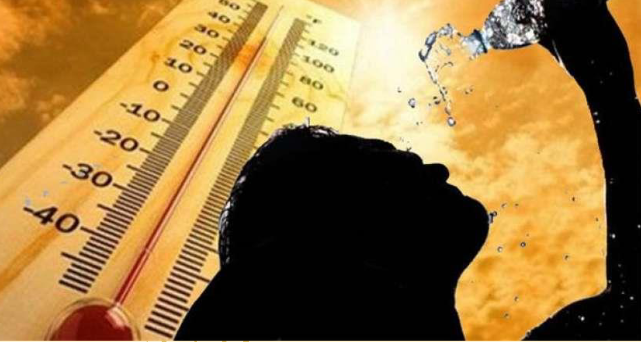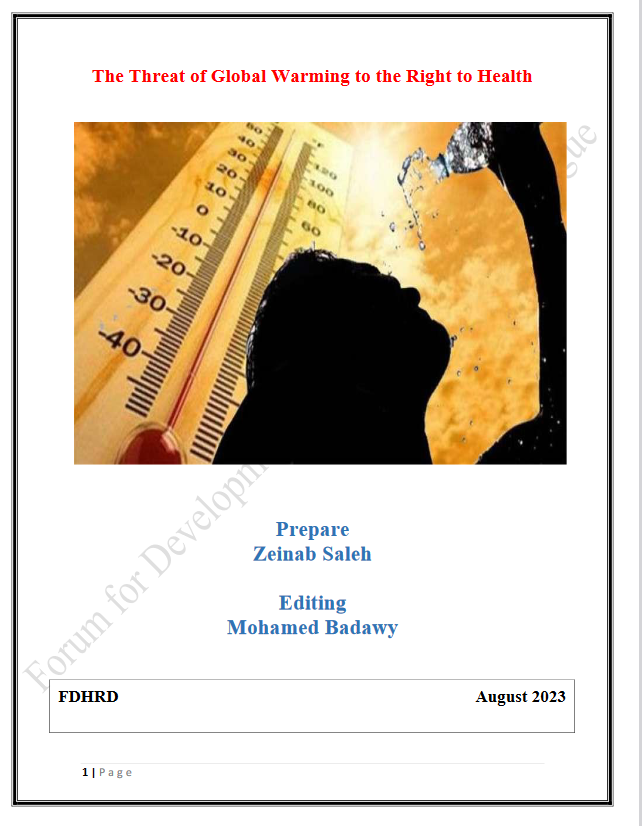Press Release
………………………………………………………………..
Today, Wednesday, 16/8/2023, the Forum for Development and Human Rights Dialogue issues its report “The Threat of Global Warming on the Right to Health”, which addresses the extent of the impact of global warming on human health and life through several axes:
- Definition of global warming,
- Causes of global warming and the rise in global temperatures,
- Impact of global warming on the right to human health, mental health, life, and mortality rates
- International and Egyptian efforts to confront global warming,
- Recommendations.
At a time when the international community is laying the foundations for the sustainable development agenda, there is ample evidence of changing terrestrial systems that push us towards troubling prospects. Environmental degradation, the widespread spread of human-induced changes, combined with natural processes, and the loss of ecosystem services are impediments to the achievement of the internationally agreed development goals.
Climate change is humanity’s greatest health threat, and the world’s health professionals are already tackling the health damage caused by this unfolding crisis. The Intergovernmental Panel on Climate Change (IPCC) has concluded that to avoid catastrophic effects on health and millions of deaths associated with climate change, the world must limit temperature rise to below 1.5°C. Because of past emissions, global temperatures rise to a certain level and other changes in the climate are inevitable. However, global warming of even 1.5°C is not considered safe; and every additional tenth of warming will seriously damage people’s lives and health.
Climate change and its impacts on public health is one of the major challenges facing the achievement of the 2030 Sustainable Development Goals. Due to increased health risks resulting from high temperatures and extreme weather events, such as cardiovascular diseases, respiratory diseases and heat stroke, in addition to direct injuries and deaths.
The report noted that high temperatures cause many health effects that affect human health. Man acquires heat from the surrounding environment around him as well as internal body temperature that is produced due to metabolic processes in the human body. When temperatures rise in the human body, this leads to several diseases, including: heat cramps, heat stress and heat stroke (a condition that causes fainting).
The human temperature rises when exposed to high temperatures internally and externally, and the human cools himself through sweating, but this is not enough. High temperatures may cause death either directly on the same day or over a longer term (after several days), especially in groups most vulnerable to diseases due to heat waves. On the other hand, high temperatures have indirect health effects. Human behavior changes as temperature rises and it is a catalyst for disease transmission and a change in air quality and quality. High heat waves cause many problems and social and economic burdens caused by rising temperatures.
The high temperature affects the health sector significantly as a result of the high demand for health services, which causes a deficit in the provision of health services to patients. High temperatures also cause an increase in demand for electricity and water and may reach in stages to power outages due to high demand for electricity. It causes problems in the agricultural environment, which individuals lose their crops due to high temperatures and the death of livestock, which leads to pressure on food security in the world due to lack of food resources.
The report concluded with the following recommendations:
- Urging all countries of the world to cooperate to reduce global warming, and to join and ratify international and regional agreements aimed at protecting the environment.
- Appealing to the countries of the world to resort to sustainable development and clean energy, in order to preserve the environment.
- All countries of the world must enact strict legislation to preserve the environment, impose the maximum penalties on those who cause environmental pollution, and activate the role of the media, school curricula and all state institutions to raise environmental awareness.
- Establish a special body for the United Nations Climate Change Convention to consider violations of global warming by countries.
- Individuals to protect the body from the damage of high temperatures should follow these tips:
• Staying hydrated is key; it is easy to get dehydrated even if you do not think you are thirsty, drink water before, during and after going out in hot weather.
• Do not go out when the sun is at its strongest, i.e. between 12 noon and 3 p.m.
• Wear lightweight, light-colored clothing from breathable fabrics such as cotton or sweat-repelling fabric.
• Drink a few glasses of water before, during and after going out or exercising, and avoid caffeinated or alcohol-containing beverages
• Wear a hat and sunglasses, and put on waterproof sunscreen before leaving the house.
• Take regular breaks while exercising.
• Continue to take all medications as prescribed by the specialist.
• Avoid hot and heavy meals as they help overheat the body.
• Stay away from sugary drinks because they cause the loss of more body fluids








